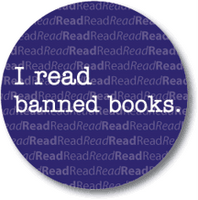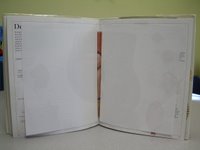
So do some of your children - if not banned at least frequently challenged. In my book that's something to celebrate, and hang onto for dear life this Banned Books Week.
Here's the list of the most Books most Frequently Challenged in 2005, as compiled by the American Library Association. You can also see the reasons for the challenges.
(A challenge is defined as a formal, written complaint, filed with a library or school requesting that materials be removed because of content or appropriateness. According to Judith F. Krug, director of the Office for Intellectual Freedom, the number of challenges reflects only incidents reported, and for each reported, four or five remain unreported.)
“It's Perfectly Normal,” by Robie H. Harris, for homosexuality, nudity, sex education, religious viewpoint, abortion and being unsuited to age group;
“Forever” by Judy Blume for sexual content and offensive language;
“The Catcher in the Rye” by J.D. Salinger for sexual content, offensive language and being unsuited to age group;
“The Chocolate War” by Robert Cormier for sexual content and offensive language;
“Whale Talk” by Chris Crutcher for racism and offensive language;
“Detour for Emmy” by Marilyn Reynolds for sexual content;
“What My Mother Doesn't Know” by Sonya Sones for sexual content and being unsuited to age group;
Captain Underpants series by Dav Pilkey for anti-family content, being unsuited to age group and violence;
“Crazy Lady!” by Jane Leslie Conly for offensive language;
and
“It's So Amazing! A Book about Eggs, Sperm, Birth, Babies, and Families” by Robie H. Harris for sex education and sexual content.
“Forever” by Judy Blume for sexual content and offensive language;
“The Catcher in the Rye” by J.D. Salinger for sexual content, offensive language and being unsuited to age group;
“The Chocolate War” by Robert Cormier for sexual content and offensive language;
“Whale Talk” by Chris Crutcher for racism and offensive language;
“Detour for Emmy” by Marilyn Reynolds for sexual content;
“What My Mother Doesn't Know” by Sonya Sones for sexual content and being unsuited to age group;
Captain Underpants series by Dav Pilkey for anti-family content, being unsuited to age group and violence;
“Crazy Lady!” by Jane Leslie Conly for offensive language;
and
“It's So Amazing! A Book about Eggs, Sperm, Birth, Babies, and Families” by Robie H. Harris for sex education and sexual content.
Off the list this year, but on for several years past, are the Alice series by Phyllis Reynolds Naylor, “Of Mice and Men” by John Steinbeck and “The Adventures of Huckleberry Finn” by Mark Twain. Other books frequently challenged over the years are Newbery Medal winner "The Giver," by Lois Lowry, "To Kill a Mockingbird," by Harper Lee, the Scary Stories series by Alvin Schwartz (very popular here).
The most challenged books of the 21st century so far? You can probably guess: The "Harry Potter" series.
Okay, so what does it mean that your school librarian is sticking up for books that have witches, sex and four-letter words in them? It simply means that I want people always to have the choice to read them.
Well, I'm certainly not going to be checking out Judy Blume's "Forever" to any of our first-graders. We don't even have that book in our library. It's not appropriate to the ages and interests of our students.
I do check out "Captain Underpants" to them, however.  In fact, I have a hard time keeping them on the shelves, or the pages attached to those rather poorly made paperbacks. As I said in my latest News Tribune column, those crazy books have been responsible for getting lots of little boys excited about reading.
In fact, I have a hard time keeping them on the shelves, or the pages attached to those rather poorly made paperbacks. As I said in my latest News Tribune column, those crazy books have been responsible for getting lots of little boys excited about reading.
 In fact, I have a hard time keeping them on the shelves, or the pages attached to those rather poorly made paperbacks. As I said in my latest News Tribune column, those crazy books have been responsible for getting lots of little boys excited about reading.
In fact, I have a hard time keeping them on the shelves, or the pages attached to those rather poorly made paperbacks. As I said in my latest News Tribune column, those crazy books have been responsible for getting lots of little boys excited about reading.Children's librarians might not believe in CENSORSHIP, but they do believe in SELECTION.
We want a good mix of materials in the library; books that will excite our children, wonderful literature, books appropriate to their ages and reading levels, books that support the curriculum. Obviously, I'm not going to select books for this library that are also in a high school library, unless they also okay for younger children to read. "Tom Sawyer" is in our library and Stadium High School's, too.
Running a library for gifted children is tricky sometimes. They often can read things they're not ready for. The part of me that doesn't believe in censorship has a hard time saying "no" to any book a child wants to check out. But if a second-grader I know is easily scared comes up to my desk with the fourth "Harry Potter," I usually can gently steer her to something else. Once or twice over the years, my persuasiveness hasn't worked and I've checked out the book, then followed up with a call home.
When parents have strong feelings about certain books or subjects, it works best if it's handled at home. I know some parents just can't abide "Captain Underpants" and have told their children they don't want them to check them out. That works a lot better than asking me to remember those preferences.
Seabury parents tend to be an open-minded bunch, but I welcome any questions about books in our library. I'd much prefer you to talk to me about concerns, rather than find out later that someone has practiced their own brand of censorship. This was a disturbing discovery I made last spring: This fine, hardback anatomy book was donated by a student whose father is a doctor. Seven pages were covered with copy paper and Scotch tape, which will pull the print right off. You can probably guess what's under the paper.

P.S. Those Robie Harris sex-Ed books on the list above are the best "birds and bees" books! She has a new one out for ages 4 and up called "It's Not the Stork!" Here's a link to her Web site: http://www.robieharris.com/ Remember if you order her books from Amazon, please do it through the link on this page and help the Seabury library. We've earned $11 so far, enough for a book!
Heading home to read "To Kill a Mockingbird" or "Huckleberry Finn."
Talk to you soon!




3 comments:
's guud
Becky, this is wonderful! Thank you!
very entertaining, useful and unbelievable !
Post a Comment